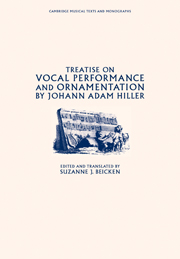Book contents
- Frontmatter
- Contents
- Acknowledgments
- Translator's introduction and commentary
- Note on the text and musical examples
- TREATISE ON VOCAL PERFORMANCE AND ORNAMENTATION
- Preface
- Dedication
- 1 On the qualities of the human voice and its improvement
- 2 On good performance and how to use the voice
- 3 On good performance, with regard to text and music
- 4 On good performance, with regard to ornaments
- 5 On good performance, with regard to passaggi
- 6 On good performance, with regard to the various genres of vocal forms and in consideration of performing in various places
- 7 On cadenzas
- 8 On arbitrary variation of the aria
- Appendix
- Bibliography
- Index
3 - On good performance, with regard to text and music
Published online by Cambridge University Press: 22 September 2009
- Frontmatter
- Contents
- Acknowledgments
- Translator's introduction and commentary
- Note on the text and musical examples
- TREATISE ON VOCAL PERFORMANCE AND ORNAMENTATION
- Preface
- Dedication
- 1 On the qualities of the human voice and its improvement
- 2 On good performance and how to use the voice
- 3 On good performance, with regard to text and music
- 4 On good performance, with regard to ornaments
- 5 On good performance, with regard to passaggi
- 6 On good performance, with regard to the various genres of vocal forms and in consideration of performing in various places
- 7 On cadenzas
- 8 On arbitrary variation of the aria
- Appendix
- Bibliography
- Index
Summary
Singers often treat text with such indifference and carelessness that it is well worth the effort to devote an entire chapter to this matter. The saying “correct speech is half the road to good singing” should be written on all four walls of every singing school so that teachers and students alike might always have it before their eyes. Speech is a very comprehensive subject, but I wish to express myself about it as briefly as possible. Permit me, then, to make a few observations about speech in general before I discuss the relationship between language and singing.
I assume that a singer who has mastered the clear execution of vowels, diphthongs, and consonants – the most important remarks on which were made in the Introduction to Part I – and who has also partially or completely overcome defects of the tongue (if he had any such problems in the first place) must still devote himself to an additional task which is not as easy as some might think. It is the art of reading with understanding and emphasis, or simply the art of declamation, to which I am referring.
To be sure, a singer who cannot read his text with understanding will also not be able to sing it with understanding. Therefore the singer is urged to read a text through before singing it, in fact so thoroughly that he catches sight of everything that a good speaker would observe in reading the text aloud.
- Type
- Chapter
- Information
- Publisher: Cambridge University PressPrint publication year: 2001



